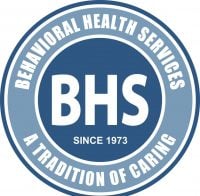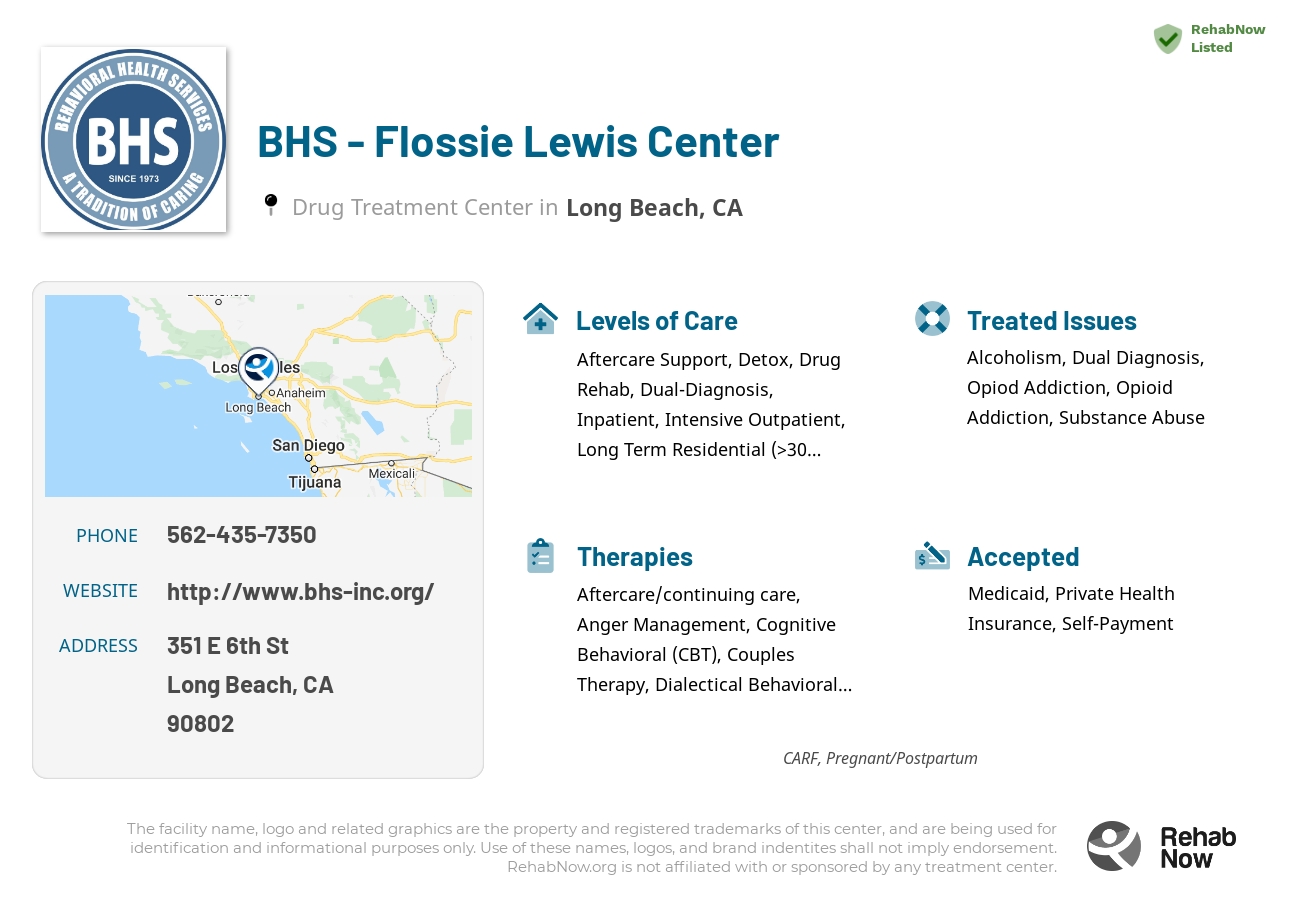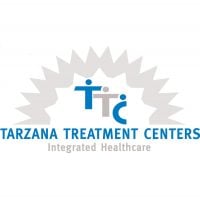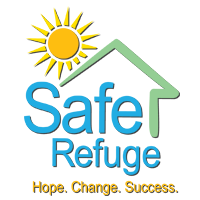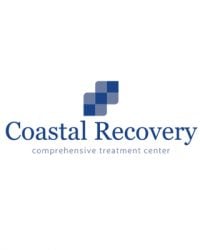About This Long Beach, CA Facility
BHS - Flossie Lewis Center, located in Long Beach, California, is an addiction treatment facility that has been providing services since 1973. They specialize in treating individuals suffering from alcoholism, dual diagnosis, opioid addiction, substance abuse, and drug addiction. The center is accredited by CARF, highlighting their commitment to meeting rigorous quality standards in the field of addiction treatment. With 34 beds available, BHS - Flossie Lewis Center offers a range of levels of care including detox, inpatient, intensive outpatient, outpatient, sober-living / half-way, and residential programs. They also provide aftercare support to ensure continued recovery and long-term success.
BHS - Flossie Lewis Center in Long Beach, California offers a comprehensive range of services for individuals struggling with addiction and substance abuse. They provide detox services to help clients safely and comfortably withdraw from substances, and residential programs for those who require a more structured and supportive environment. The center also offers intensive outpatient and outpatient programs, allowing individuals to receive treatment while still maintaining their daily responsibilities. With a focus on dual-diagnosis, BHS - Flossie Lewis Center addresses the underlying mental health issues often associated with addiction. Additionally, they provide aftercare support to help clients transition back into their communities and maintain sobriety.
Genders
Ages
Modality
Additional
Accreditations

CARF
The Commission on Accreditation of Rehabilitation Facilities (CARF) is a non-profit organization that specifically accredits rehab organizations. Founded in 1966, CARF's, mission is to help service providers like rehab facilities maintain high standards of care.
Conditions and Issues Treated
Substance abuse refers to the intensive and inappropriate use of psychoactive substances. Psychoactive substances are those that affect brain function. These include illegal drugs, alcohol, and even the excessive use of prescription drugs. The overuse of psychoactive substances leads to severe physical or psychological dependence. It also affects the social life and relationships of the affected individual. Substance abuse is treatable.
The duration of treatment at BHS - Flossie Lewis Center in Long Beach can require weeks or even months depending on the severity of the condition as there is a risk of relapse. Treatment options include medications, counseling sessions, various types of behavioral therapy, and group therapy in different combinations.
Addiction to prescription opioid painkillers like oxycodone and hydrocodone, and illicit opioids such as heroin, leads to potentially life-threatening withdrawal symptoms when discontinued. Opioid addiction treatment typically involves an inpatient stay at facilities like BHS - Flossie Lewis Center to make sure they get through withdrawal safely. Treatment also includes comprehensive mental health counseling.
Conditions such as anxiety, depression, schizophrenia, bipolar disorder are part of mental illness. This may occur that opioid abuse and vice versa are induced by mental illness. Diagnosing a concurrent diagnosis or co-occurring condition at BHS - Flossie Lewis Center is essential to understand the addiction better.
Levels of Care Offered
This center offers a variety of custom treatment tailored to individual recovery. Currently available are Aftercare Support, Detox, Drug Rehab, Dual-Diagnosis, Inpatient, Intensive Outpatient, Outpatient, Residential, Sober-Living / Half-Way, with additional therapies available as listed below.
Detox is the primary substance abuse treatment administered to a patient suffering from drug addiction. Detox helps patients in Long Beach, CA recover from drug-addicted through regular monitoring of medical professionals and temporary utilization medication, other techniques.
If you or someone you know suffers from a substance abuse problem, it is crucial to understand the different options available for treatment and seek help as early as possible. These days, detox centers offer several methods for drug and alcohol addiction rehabilitation and treatment.
An intensive outpatient program is a good option for someone in California with a milder or less severe addiction. An IOP may involve daily meetings at a treatment facility, along with personal counseling and peer meetings. Some IOP programs offer half-day treatment, while others offer full-day programs. BHS - Flossie Lewis Center‘s IOP is customized per individual.
Outpatient programs are the standard for addiction treatment. About 9 in 10 U.S. adolescents entering addiction treatment enroll in these programs, so you’re not alone in Long Beach, CA. Treatment is delivered in different settings – offices, clinics, and primary care clinics.
Facilities offer a variety of services, such as individual and group counseling and family therapy. During the sessions, you work with a team of experts that include: General physicians, Psychiatrists, Social Workers, and Psychologists. The main goals of outpatient recovery programs are to help addicted individuals reduce drug use and addictive behaviors, eventually becoming entirely sober.
Sober living houses like BHS - Flossie Lewis Center in Long Beach help the patient move from a structured recovery facility to an everyday life smoothly. They are also known as homes for recuperation or half-way houses. SLH offers the value of living with a peer group with similar experiences and is recovering collectively, instead of individualized or alone.
Residential treatment programs are those that offer housing and meals in addition to substance abuse treatment. Rehab facilities that offer residential treatment allow patients to focus solely on recovery, in an environment totally separate from their lives. Some rehab centers specialize in short-term residential treatment (a few days to a week or two), while others solely provide treatment on a long-term basis (several weeks to months). Some offer both, and tailor treatment to the patient’s individual requirements.
Aftercare comprises services that help recovering addicts readjust to normal day-to-day California activities. It can last a year or even longer. Services include individual and family counseling, medications to reduce cravings, and treatment of psychiatric and other medical conditions. Aftercare support begins once you have completed earlier stages of treatment.
BHS - Flossie Lewis Center‘s Therapies & Programs
In addiction recovery at BHS - Flossie Lewis Center, therapy plays a significant role. This helps patients get to the root of their addiction and discover how the problems that contributed to their use can be handled better. Therapy can be performed in a group and one on one settings. The patient interacts with the therapist in a one-on-one atmosphere during individual therapy. This encourages them to reflect on the underlying addiction problems and develop ways to avoid potential future abuse.
Addiction and alcoholism affect the entire family. For this reason, family therapy is vital to a person’s recovery from addiction. In contrast to couples counseling, family therapy at BHS - Flossie Lewis Center may include siblings, children, parents, and other significant people in the recovering person’s life. Family support is one of the most important pillars of recovery.
Many people turn to drugs and alcohol as a way of processing trauma that has affected them in the past. Trauma can include abuse, neglect, the loss of a loved one and other unpleasant incidents. Trauma therapy at BHS - Flossie Lewis Center helps patients process trauma. It gives them the tools to deal with it in a healthier manner.
Cognitive Behavioral Therapy (CBT) examines the relationship between a patient’s thoughts, feelings and behaviors. BHS - Flossie Lewis Center aims to establish a healthy response to thoughts and feelings as an alternative to turning to drugs and alcohol. It also promotes healthy communication between addicts and those around them. It is and effective therapy for people suffering with all types of addictions.
Life skills pertain to the skill sets a person should possess to become successful in life. Examples are time management, budgeting, and social abilities. Life skills therapy highlights the fact that addiction recovery is more than just a person’s ability to go through their day-to-day without resorting to substance use in Long Beach, CA once they leave the facility.
The recovery technique used by Alcoholics Anonymous is the 12 step program, but it can relate to any form of addiction. The 12 steps that addicts must take on the road to recovery are explained. Measures include acknowledging that you have a problem and agreeing to turn around your life. The curriculum, instructed by BHS - Flossie Lewis Center, also requires a belief in a greater power and making amends to others.
Payment Options Accepted
For specific insurance or payment methods please contact us.
Is your insurance accepted?
Ask an expert, call (888) 674-0062
BHS Associated Centers
Discover treatment facilities under the same provider.
- BHS - Hollywood Family Recovery Center in Los Angeles, CA
- BHS - The ARCH in Pomona, CA
- BHS - South Bay Family Recovery Center in Gardena, CA
- BHS - High Gain Drinking Driver Program in Los Angeles, CA
- BHS - Hollywood Recovery Center in Los Angeles, CA
Learn More About BHS Centers
Additional Details
Specifics, location, and helpful extra information.
Long Beach, California 90802 Phone Number(562) 435-7350 Meta DetailsUpdated November 25, 2023
Staff Verified
Patient Reviews
There are no reviews yet. Be the first one to write one.
Long Beach, California Addiction Information
More than 3 million of California's citizens are addicted to illegal drugs. Almost 800,000 people use hard drugs, almost 5 million use marijuana, and another 2.1 million abuse alcohol every year. Other substance abuse issues such as binge drinking and teen drug use are also common. Many illegal drugs such as cocaine, heroin, methamphetamine, and marijuana are smuggled into the state from Mexico.
Nearly 9.8% of the population of Long Beach, CA, abuses drugs or alcohol. From 2002 to 2016, Long Beach saw a 245% increase in opioid-related hospitalizations. In 2015, 2% of eighth-graders reported using ecstasy. In 2016, Long Beach had a rate of drug overdose deaths more than 2.5 times that of the U.S. Drug treatment in Long Beach, typically involves detoxification, therapy, and aftercare support.
Treatment in Nearby Cities
- Copperopolis, CA (321.8 mi.)
- Antioch, CA (355.9 mi.)
- Galt, CA (355.4 mi.)
- Walnut, CA (25.2 mi.)
- Norco, CA (38.3 mi.)
Centers near BHS - Flossie Lewis Center
The facility name, logo and brand are the property and registered trademarks of BHS - Flossie Lewis Center, and are being used for identification and informational purposes only. Use of these names, logos and brands shall not imply endorsement. RehabNow.org is not affiliated with or sponsored by BHS - Flossie Lewis Center.
